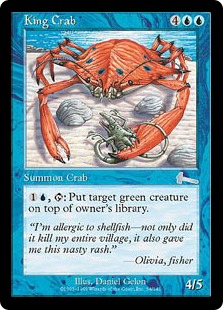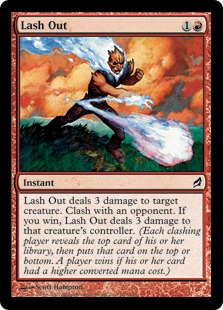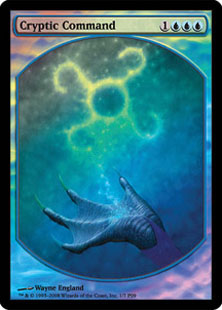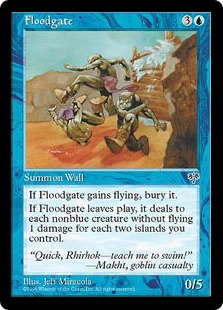
Feeling Crabby
or, Old Bay Will Haunt My Dreams
By Eli Shiffrin, Brian Paskoff, and Aaron Stevenson
or, Old Bay Will Haunt My Dreams
By Eli Shiffrin, Brian Paskoff, and Aaron Stevenson

Sob.
I'm consoling myself by gorging on the [email]cranial.insertion@gmail.com[/email] mailbox and denying Moko the pleasure. I'm sure he's off urinating on my bed to show his displeasure. But this is what I have a cadre of judges for. Cleaning up monkey pee.
So send your questions off to our jolly inbox! They'll either keep me company here before I head off to Los Angeles for a Grand Prix, or they'll calm Moko down and reduce the total amount of mess to clean up.
Anyway. Column ahoy!
Q: Do Blood Moon and the like change artifact lands into nonartifact basic lands?
A: Blood Moon sure doesn't, but some of its friends might. The key is to look at what they change - if they say the lands are Mountains, that only changes the land subtype. Such an effect won't give or take a card type (Artifact) or supertype (basic) without specifically saying so.
Fun fact: No cards specifically say so. Tree of Tales might start spitting out red mana, but it won't stop being an artifact or become basic without some extra special shenanigans thrown in.
Q: If I imprint an Arcane card on my Isochron Scepter and then play a copy of it with the Scepter's ability, can I splice other cards onto that copy?
A: You sure can! Isochron Scepter has you playing the copy of the card and the copy copies everything copiable (say that three times fast), including the Arcane subtype. Since it's Arcane and you're playing it, you can pay additional costs like splice. Note that you do have to pay that additional cost - the stick only lets you ignore the spell's mana cost, not additional costs.
Q: If my opponent has a Trinisphere and I cast Force of Will for its alternate cost. Do I still have to pay an additional for it?
A: When dealing with Trinisphere, if you're foolish enough to let it resolve and resist the urge to rip the card up, there's a simple rule to remember: Apply every other possible thing that affects costs before Trinisphere. "Play it for free" affects cost, so you apply "free" before Trinisphere and end up having to pay .
Q: If I Lash Out at a creature and it gets sacrificed in response, do we still clash?
A: A spell with its legal targets illegalified is countered on resolution entirely - none of its effects at all will happen, so you won't clash.

Lash Out, causing Looking at
Extra Cards violations since 2007.
Extra Cards violations since 2007.
A: Now you're all bad people and the DCI ninjas will come for you.
This is actually fairly simple, though, so the ninjas will only glare at you silently from their dark shadows and not stab you. But you will feel shame. Oh yes, so much shame.
It's Looking at Extra Cards, an infraction that carries a penalty of a Caution at FNM and a Warning at Worlds. You'll remedy this grievous transgression by taking aside any cards whose positions were legally known (such as byscrying or Hallowed Burial) and shuffling the rest, then returning the legally-known cards to their positions. This assumes that the looked-at card was not legally known; if it was, you just get your Caution or Warning and carry on without shuffling anything.
It's worthwhile to note, though, that you do not reveal that looked-at card to the opponent. This used to be policy, but that policy has since changed and some people haven't noticed.
Q: Does Tatterkite pretty much have protection from damage if Everlasting Torment is out?
A: That's a bit inaccurate as far as the rules are concerned, but it's a pretty dang accurate summary. All damage that would be dealt to Tatterkite is dealt in the form of -1/-1 counters that can't be put on it, so it simply cannot receive damage. This damage isn't prevented; it's dealt (and triggers lifelink and deathtouch) but doesn't have any result. Freaky, huh?
Q: Can Spiders with reach block a creature with Treetop Bracers on?
A: Your itsy-bitsy Spider is out of luck. Once upon a time, it could block as though it had flying. Now it has reach and can merely block creatures with flying despite not having flying itself. Without ever actually having flying or being treated as though it did, Spiders can't block creatures that can only be blocked by creatures with flying.
Q: Can Reflecting Pool produce if I have a Cabal Coffers but no Swamps?
A: If you have no Swamps and play the Coffers' ability, what will you get? A big fat nothing.
That's what Reflecting Pool sees. You get nothing, and certainly not any black mana, so it won't provide you with swampjuice.
Q: My friend tells me that if he has a Seat of the Synod, an Ornithopter, and a Chromatic Star out, he can play a Frogmite for due to affinity, but pay for it with mana filtered through the Star to draw a card. This doesn't make sense to me, although my friend has a better understanding of the rules than I. Is he right?
A: Your friend is indeed correct. This comes down to the steps of playing a spell, which can be summed up with this awesome mnemonic device:
All Crazy Teenagers Have Tried Magic Pills
Which stands for:
Announce Choose Target How Total Mana Pay
First, announce the spell and move the card to the stack. Then choose...well, just about everything other than targets. Choose modes, alternative costs, additional costs, hybrid costs. After all that, you pick your targets. Then you decide how to divide stuff among the targets if there is any such division. After that, determine - and lock in - the total cost, play mana abilities, and then make all payments.
For our dear froggy friend here, that "Total" step is where he figures "oh hai I cost ." In the "Mana" step, your friend can sacrifice Chromatic Star, since this is a mana ability, and get a card before he gets to the "Pay" step where he pays the locked-in cost: .
Q: If a creature with graft dies in response to the graft trigger, do I still get to move a +1/+1 counter?
A: Move? But there are no counters! They got buried with the creature, and don't you dare go grave-robbing.
"Move" means just that: there has to be a counter on the permanent, and it has to be able to land on its destination. If the permanent is gone, there can't be any counters left to move, so you can't have it.
Q: I have both Hostility and Furnace of Rath. Who chooses which applies first if I Shock my opponent?
A: You'd think that since it's your Furnace and your Hostility that you'd chose, but you'd be wrong. The affected player (or controller of the affected object) picks the order, and your opponent who's about to get smacked in the face with a bolt of lightning is the affected player.
Q: My opponent plays Wrath of God when I have Hissing Iguanar and six tokens in play. Do I get to do any damage?
A: You do! Leaves-play triggers have to look back in time to function, which means that anything that dies at the same time as the Iguanar will trigger its ability. You'll get six happy little pingy triggers.
Q: My Mogg Fanatic is carrying a Quietus Spike and I throw it at my opponent's Demigod of Revenge. Does it die?
A: Once again, Magic breaks down a bit if you look at it realistically. The Mogg was holding a Spike, but when it was sacrificed, it immediately dropped the Spike - and so the Mogg won't have deathtouch anymore. Without the deathtouch trigger hanging around, the damage won't cause the trigger to trigger, and the Demigod will live with a bit of a goblin-shaped bruise.
[Ed.'s note: In rulespeak, the Fanatic was sacrificed as the cost of putting its ability on the stack. This is the point where the equipment became unattached, several priority passes before the damage was finally dealt.]

Still the worst card ever
to make textless.
to make textless.
A: Well, Cryptic Command had exactly one target: Treetop Village. The player isn't targeted by the "tap your dudes" mode; that just hits all opponents' creatures. With its only target gone, Cryptic Command is countered on resolution and nothing happens.
Q: I control Militia's Pride and swing and pay to make tokens. My opponent Gather Specimens in response. Does he get tokens attacking himself or attacking me?
A: Neither! With the new rule 306.3b, a creature that comes into play attacking under the control of a player other than an attacking player doesn't attack anyone; it just comes into play and waves. Comes into play tapped, in this case, so it won't even be able to block. (If you're following along in the CompRules at home, note that 306.3b has a typo in the rule number and may be listed as "306.b")
On the other hand, there's a bit of a shortcut going on here. Saying "I attack and pay for a token" is shortcutting a lot of priority passes and steps involved; that's normally fine, but your opponent broke the shortcut by playing Gather Specimens in response to the trigger. Which means that you're under no obligation to actually pay, and you don't have to give him a token.
Q: When I sacrifice Yavamaya Elder, do I get my card or the lands first?
A: Sacrificing the Elder for its ability puts the activated ability on the stack right away. When you pay the cost of said ability, the Elder's other ability triggers and goes on top of the activated ability. So the land-searching will resolve first, then you get a card from your thinned-out library.
Q: I use Ajani Vengeant's second ability to deal 3 to my opponent, but he sacrifices Burrenton Forge-Tender to prevent the damage. Do I still gain life?
A: Sure! The Forge-Tender stops the damage, but Ajani doesn't say anything about the lifegain being contingent on the damage being dealt. You'll see that sometimes with an "if you do" or "gain life equal to the damage dealt this way," neither of which show up here.
Q: I have Prison Term on my opponent's creature and he plays a Changeling Hero. What happens now?
A: Now you've got two triggers. Your trigger wants to move the Term, and your opponent's wants him to remove a creature. Since it's his turn, his trigger goes on the stack first; yours will be put on top and resolve first. So if you put the Prison Term on the Hero, he can then choose not to remove anything and let the Hero die; if you don't, he can champion the creature with the Term on it.
Q: What happens if I Humble Floodgate in response to its "gains flying" trigger so that it loses flying?
A: The Floodgate losing flying won't matter; its sacrifice trigger doesn't include the awesomeness of an intervening "if" clause. It would look pretty dumb with one, though - "When Floodgate has flying, if it has flying, sacrifice it." Dumb, huh? But without that clause, it only needs to have flying to trigger, and then it will be sacrificed no matter how much it loses flying in the meantime.
On the bright side, possibly, the Floodgate won't have its second trigger due to Humble, so no damage will be dealt when it breaks. Yes, floodgates don't work like that. No, Magic doesn't care.

VestDan will not shut up
about this card. He may or may
not have edited this article.
about this card. He may or may
not have edited this article.
A: Then stuff is going to be flying all over, in multiple senses of the word. Your Floodgate will spring into the air and be sacrificed. Then damage will be dealt, and Lifeline will create a delayed end-of-turn trigger to bring back the Floodgate; stuff dies, and they all get a Lifeline trigger of their own, too.
At end of turn, the nonactive player brings back all of his stuff in any order he wants, then the active player does. You'll sacrifice Floodgate as soon as it comes back - and if you have anything else to bring back, you can bring it back before or after the Floodgate. Damage from the first flood will still be on the creatures, so this could make more stuff die, too!
If you're the nonactive player, you'll sacrifice Floodgate and deal damage before the active player's creatures come back at all. Otherwise, they'll come back first and be caught in the flood. When it's sacrificed after the end of turn step has started, Floodgate won't come back until the following turn, though; so you didn't entirely break the game, although you did present a disgusting number of options and possibilities.
Q: Can you use foils in tournaments? A friend of mine said something about them being marked cards.
A: Your friend is half right. While foils can very easily become marked, they're not marked by virtue of being foil. What you have to watch out for, though, is the bending. Foil cards will start to curve faster than nonfoil cards, especially in humidity, so you need to check your deck for little gaps from bending foils before every game.
Q: Where do I find all these rules so I can answer questions for myself?
A: You haven't memorized the Comprehensive Rules? You must be new here. You can download the rules from Wizards of the Coast's site here:
http://wizards.com/Magic/TCG/Resources.aspx?x=magic/rules
If you want your rules to go, you can also view a hyperlinked, non-downloadable version on the web:
http://yawgatog.com/resources/magic-rules/
And for roughly the same thing but with a much funnier name, you can go here:
http://underweargoesinsidethepants.com/magicrules/
A fair warning: The Comprehensive Rules are not meant to be read straight through. The document's a resource for resolving specific problems. If you try to read it through, you may lose your sanity and/or marbles.
Okay, time to go off into the wild green yonder. If you're coming to Grand Prix: Los Angeles, look for me judging!
Until next time, shun the seafood.
- Eli Shiffrin
Tucson, Arizona
Comments